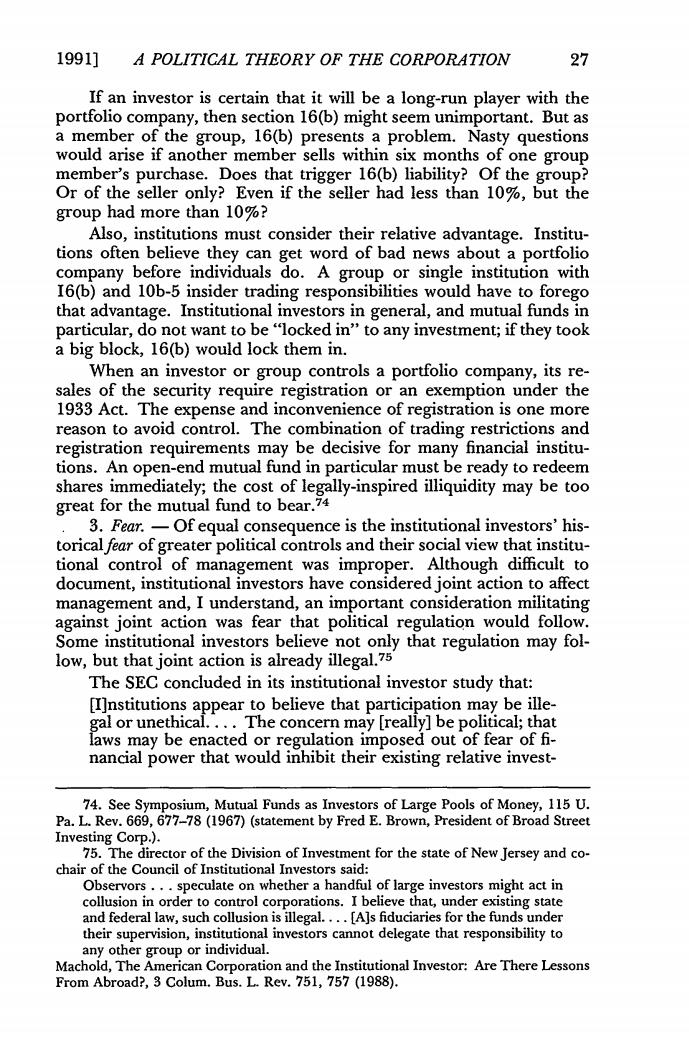正在加载图片...

1991] A POLITICAL THEORY OF THE CORPORATION 27 If an investor is certain that it will be a long-run player with the portfolio company,then section 16(b)might seem unimportant.But as a member of the group,16(b)pres sents a problem.Nasty questions would arise if another em sells within six m nths of one group trigger 16(b)liability?Of Or of the seller only?Even if the seer had less than 10%but the group had more than 10%? Also,institutions must consider their relative advantage tions often believe company before individuals do.group or single ins ey about a portfolic institution with 16(b)and 10b-5 insider trading responsibilities would have to forego that advantage.Institutional investors in general,and mutual funds in particular,do not want to be"locked in'to any investment:if they took a big block,16(b)would lock them in When an investor or group controls a portfolio company,its re- sales of the security require registration or an exemption under the 1933 Act.The expense and inconvenience of registration is one more reason to avoid control.The combination of trading restrictions and registration requir decisive for many fina ncial in titu tions.An open-end mutual fund in particular must be ready to redeem shares immediately;the cost of legally-inspired illiquidity may be too great for the mutual fund to bear.74 3.Fear.-Of equal consequence is the institutional investors'his- toricalfear of gre ater political controls and their s ocial vie that institu tional control of management was improper. Although difficult to document.institutional investors have considered joint action to affect management and,I understand,an important consideration militating against joint action was fear that political regulation would follow. Some nal inve stors believe not only that regulation may fol low,but that joint action is aready The SEC concluded in its institutional investor study that: Institutions appear to believe that particpation or u con rn may [rea cal;th en d Bu impos I Dower wou their ex isting relative 74.See Symposium Pa.L.Re tual Funds as Investors of Large Pools of Money,115 U .66 677-78(1967)(statement by Fred 58 r of the Division of Investment for the state of New Jersey and co- chair of the Council of Institutional Investors said: Observors.speculate on whether a handful of large investors might act in collusion I order to control corporations.I ve t at,und ing state thei ca 39 p or individual. Machold,The American Corporation and the Institutional Investor:Are There Lessons From Abroad?,3 Colum.Bus.L Rev.751,757(1988). 1991] A POLITICAL THEORY OF THE CORPORATION 27 If an investor is certain that it will be a long-run player with the portfolio company, then section 16(b) might seem unimportant. But as a member of the group, 16(b) presents a problem. Nasty questions would arise if another member sells within six months of one group member's purchase. Does that trigger 16(b) liability? Of the group? Or of the seller only? Even if the seller had less than 10%o, but the group had more than 10%? Also, institutions must consider their relative advantage. Institutions often believe they can get word of bad news about a portfolio company before individuals do. A group or single institution with 16(b) and lOb-5 insider trading responsibilities would have to forego that advantage. Institutional investors in general, and mutual funds in particular, do not want to be "locked in" to any investment; if they took a big block, 16(b) would lock them in. When an investor or group controls a portfolio company, its resales of the security require registration or an exemption under the 1933 Act. The expense and inconvenience of registration is one more reason to avoid control. The combination of trading restrictions and registration requirements may be decisive for many financial institutions. An open-end mutual fund in particular must be ready to redeem shares immediately; the cost of legally-inspired illiquidity may be too great for the mutual fund to bear.74 3. Fear. - Of equal consequence is the institutional investors' historicalfear of greater political controls and their social view that institutional control of management was improper. Although difficult to document, institutional investors have considered joint action to affect management and, I understand, an important consideration militating against joint action was fear that political regulation would follow. Some institutional investors believe not only that regulation may follow, but that joint action is already illegal. 75 The SEC concluded in its institutional investor study that: [I]nstitutions appear to believe that participation may be illegal or unethical. The concern may [really] be political; that laws may be enacted or regulation imposed out of fear of financial power that would inhibit their existing relative invest- 74. See Symposium, Mutual Funds as Investors of Large Pools of Money, 115 U. Pa. L. Rev. 669, 677-78 (1967) (statement by Fred E. Brown, President of Broad Street Investing Corp.). 75. The director of the Division of Investment for the state of New Jersey and cochair of the Council of Institutional Investors said: Observors. speculate on whether a handful of large investors might act in collusion in order to control corporations. I believe that, under existing state and federal law, such collusion is illegal. [A]s fiduciaries for the funds under their supervision, institutional investors cannot delegate that responsibility to any other group or individual. Machold, The American Corporation and the Institutional Investor: Are There Lessons From Abroad?, 3 Colum. Bus. L. Rev. 751, 757 (1988)